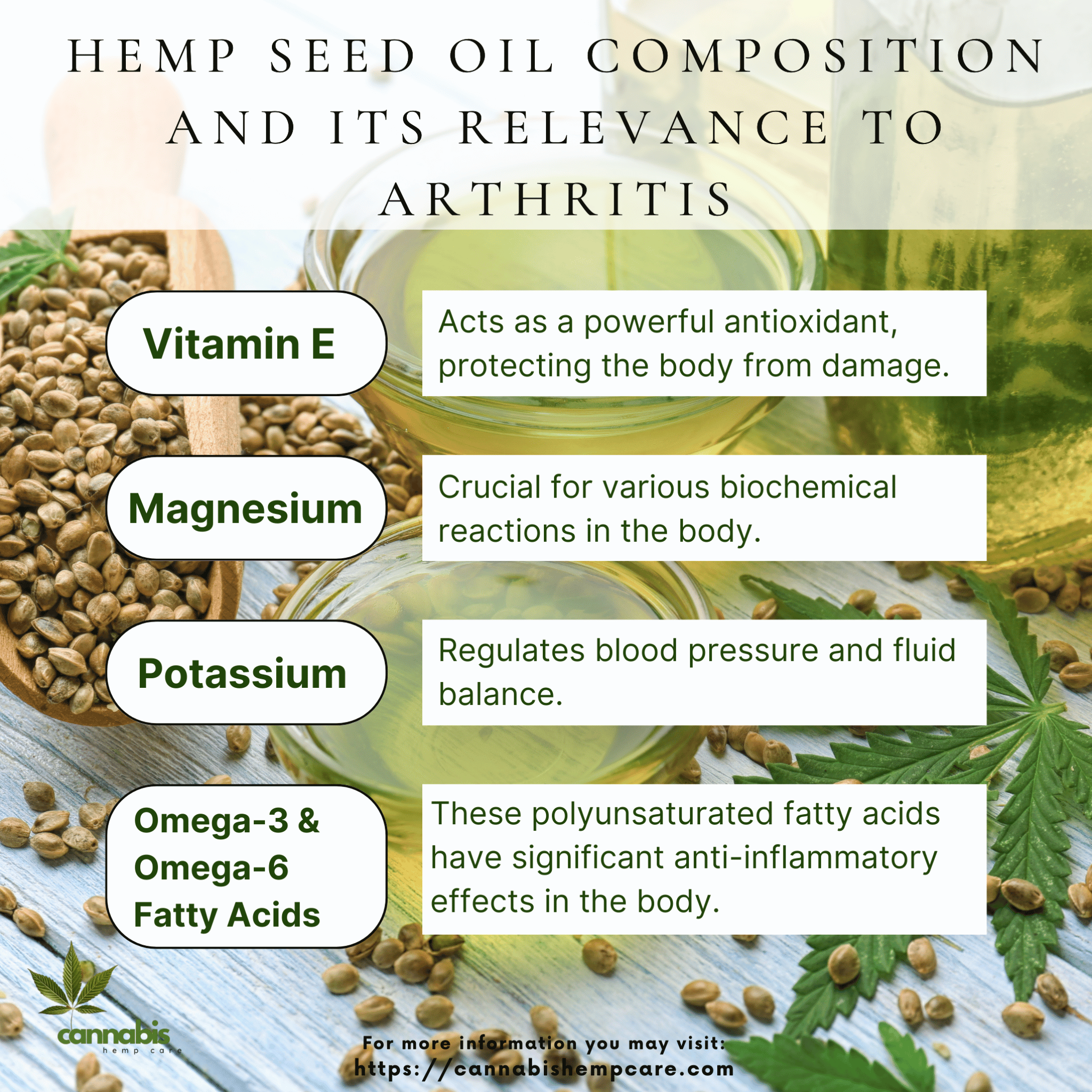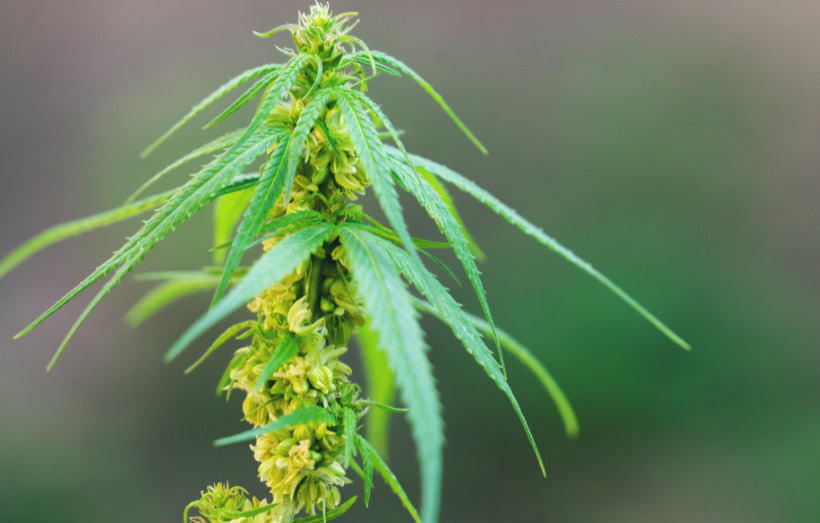Arthritis, a term often used to describe joint pain or joint disease, is a prevalent condition affecting millions worldwide. It causes pain, stiffness, and swelling in the joints, adversely impacting an individual’s quality of life. Recent clinical research has centered on the potential benefits of hemp seed oil for arthritis pain.
This oil, derived from the Cannabis sativa L plant, is distinct from other derivatives due to its low THC content. Specifically, hemp contains 0.3% or less THC, ensuring no “high” effect, and allowing it to undergo stringent legal scrutiny.
Hemp Seed Oil Composition and Its Relevance to Arthritis
Hemp seed oil is rich in essential nutrients pivotal to health. These include:

- Vitamin E: Acts as a powerful antioxidant, protecting the body from damage.
- Magnesium: Crucial for various biochemical reactions in the body.
- Potassium: Regulates blood pressure and fluid balance.
- Omega-3 and Omega-6 fatty acids: These polyunsaturated fatty acids have significant anti-inflammatory effects on the body. For instance, Gamma Linolenic Acid (GLA) found in hemp seeds was observed in the Journal of Arthritis and Rheumatology to have improved arthritic symptoms by 25% when compared to a 4% placebo1.
Such components can positively modulate the immune system response and potentially relieve the symptoms of joint pain due to arthritis.
Mechanism of Action in Arthritis
Rheumatoid arthritis, a type of autoimmune disorder, prompts an aggressive immune system response, attacking the joints. Osteoarthritis, on the other hand, affects joint cartilage and bones, causing pain and stiffness. In conditions like these, the body experiences inflammation, often leading to swollen and stiff joints.
Hemp seed oil, notably, impacts a type of cell known as MH7A. Studies suggest that in rheumatoid arthritis, these cells intensify arthritic inflammation. The fatty acids in hemp seed oil can disrupt these cells’ function, mitigating inflammation.
Moreover, the oil induces reactive oxygen species and C/EBP homologous protein-mediated apoptosis in MH7A human RA fibroblast-like synovial cells. These processes may contribute to the anti-rheumatoid effects of hempseed.
The influence of hempseed oil on oxidative stress and the endoplasmic reticulum (ER) further underscores its potential as a therapeutic agent.
Application and Absorption
The skin contains capillary glands adept at absorbing nutrients. When hemp seed oil or CBD oils are applied topically, they penetrate these layers, binding to cannabinoid receptors present.
This method offers localized relief, especially beneficial for areas of pain. When ingested orally, the absorption takes place sublingually, through these capillaries, or it undergoes digestion, breaking down in the liver.

Hemp Seed Oil: Side Effects to Consider
Imagine you’re trying a new type of food or skincare product for the first time. There’s a small chance it might not sit well with your stomach, or your skin might react differently than expected. Similarly, even though hemp seed oil is a natural option for managing pain, especially pain from arthritis, it can have a few side effects.
- Digestive issues: Just like some foods can give you an upset stomach, some people might feel a bit queasy or experience stomach discomfort when they start using hemp seed oil.
- Skin reactions: If you’re applying the hemp oil directly to your skin, there might be some redness, itching, or other minor reactions. It’s like how some people’s skin doesn’t like certain lotions or creams.
Because of these possible reactions, it’s a good idea to talk to your doctor before you start using hemp seed oil for arthritis. This is especially important if you’re already taking other medicines, to make sure everything works well together.
Beyond Hemp Seed Oil: A Comprehensive Approach to Arthritis
Think of managing arthritis pain like taking care of a garden. Just watering the plants isn’t enough; you need to make sure they get enough sunlight, the soil is good, and there are no pests around.
Similarly, using hemp seed oil for arthritis might help with arthritis pain, but there are other things you can do to help the process along.
The Arthritis Foundation, which is like a guidebook for understanding and managing arthritis, suggests a few other ways to help:
Improved sleep
Adequate sleep is a cornerstone of good health, playing a pivotal role in managing pain. According to the National Centers for Complementary and Integrative Health, lack of sleep can exacerbate pain and inflammation in the body, making it even more challenging to manage symptoms of arthritis.
Regular deep sleep helps to repair body tissues and reduces the level of stress hormones, which can magnify pain perception. For individuals with arthritis, achieving restful sleep not only rejuvenates the body but also provides natural pain relief.
Exercise
Regular movement, even if it’s gentle, can assist in keeping joints agile and decreasing stiffness. The Arthritis Foundation notes that exercise is one of the most effective non-drug treatments for reducing pain and improving movement in patients with osteoarthritis.
Activities like walking, swimming, or yoga can strengthen the muscles around joints, offering more support and less strain.
Moreover, exercise releases endorphins – the body’s natural painkillers – providing an additional layer of pain management.
Mindfulness
Techniques that center you in the present moment can be valuable allies against stress, further aiding pain management. Mindfulness practices, such as meditation and deep breathing exercises, have been shown to reduce the severity of pain for many arthritis sufferers.
A study published in the Journal of Arthritis and Rheumatology highlighted that regular mindfulness practices could even diminish the need for pain medications.
By focusing on the present, individuals can break the cycle of pain, anxiety, and stress, allowing for a more holistic approach to arthritis pain relief.
Diet changes
A balanced diet with inflammation-fighting ingredients can bolster the benefits derived from hemp seed oil, ensuring a comprehensive approach to arthritis care. Foods rich in Omega-3 fatty acids, such as fish, flaxseeds, and walnuts, have demonstrated anti-inflammatory effects.
Moreover, antioxidants found in berries, spinach, and nuts combat oxidative stress, which can contribute to inflammation.
Including these nutrients in one’s diet can complement the benefits of hemp seed oil and other natural pain relief measures, offering a more rounded strategy for managing arthritis symptoms.

CBD Oils and Arthritis
CBD oils for joint pain have gained traction in the medical community. While distinct from hemp seed oil, both fall under the larger umbrella of effective natural remedies.
CBD for arthritis pain has been the focal point of many studies. Its potential in alleviating symptoms of other conditions, such as seizure and epilepsy, further underscores its therapeutic potential.

Conclusion: Does it work? Yes.
Emerging clinical research shows that hemp seed oil holds promise to relieve pain and reduce inflammation associated with arthritis. Conditions such as rheumatoid arthritis and osteoarthritis, which affect joint cartilage and bones, causing pain and stiffness, may benefit from hemp seed oil’s therapeutic properties.
While the quest for the best hemp seed oil for arthritis is ongoing, the evidence tilts toward its potential benefits. Individuals seeking a more natural approach to pain management may find solace in hemp seed oil, underpinned by both scientific and traditional wisdom. Still, as always, consultation with healthcare professionals is paramount.
FAQs on Hemp Seed Oil for Arthritis
How do you use hemp seed oil for arthritis?
Hemp seed oil can be taken orally, for instance, in capsule form, drizzled on salads, added to smoothies, or simply consumed from a spoon. Alternatively, it can also be used topically as a calming hemp balm or massage oil.
Is hemp seed oil a good anti-inflammatory?
Yes. It’s been suggested that gamma-linolenic acid, an omega-6 fatty acid found in hemp, acts as an anti-inflammatory.
Can I take hemp seed oil every day?
Absolutely. Due to hemp oil’s high concentration of GLA, regularly consuming it can be beneficial, especially for those who don’t consume fish or eggs, ensuring they reach their recommended daily intake of healthy fat.
How long does hemp seed oil take to work?
The effects of hemp seed oil can typically be felt within 15 to 45 minutes of consumption or application.
What is better for pain: CBD oil or hemp oil?
While hemp oil generally offers more nutritional benefits, CBD oil stands out when it comes to pain relief, especially for conditions like anxiety and depression. However, hemp oil can still provide some pain-relief benefits.
What are the disadvantages of hemp seed oil?
Consuming hemp seed oil in large amounts can lead to digestive discomfort, including symptoms like bloating, nausea, or constipation.
Sources
- Zurier, R. B., Rossetti, R. G., Jacobson, E. W., Demarco, D. M., Liu, N. Y., Temming, J. E., White, B. M., & Laposata, M. (1996). Gamma-linolenic acid treatment of rheumatoid arthritis. A randomized, placebo-controlled trial. Arthritis & Rheumatism, 39(11), 1808–1817. https://doi.org/10.1002/art.1780391106
↩︎




































